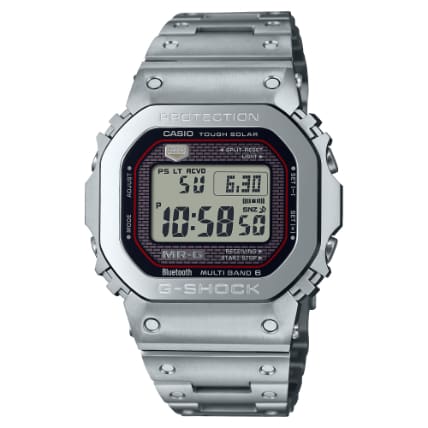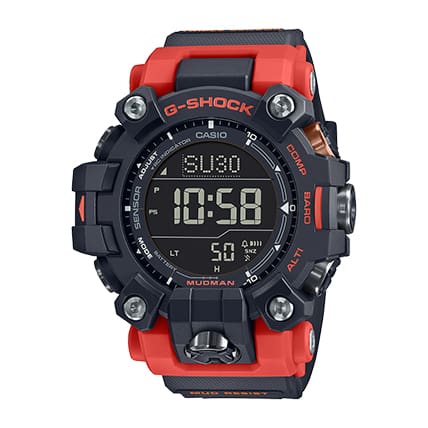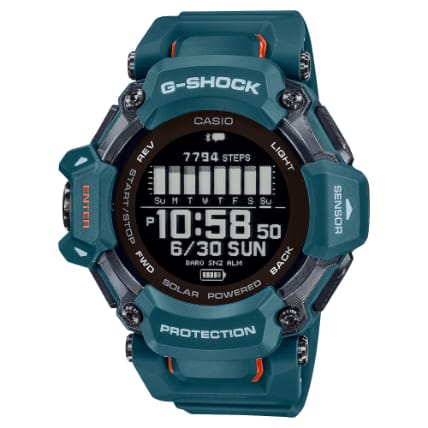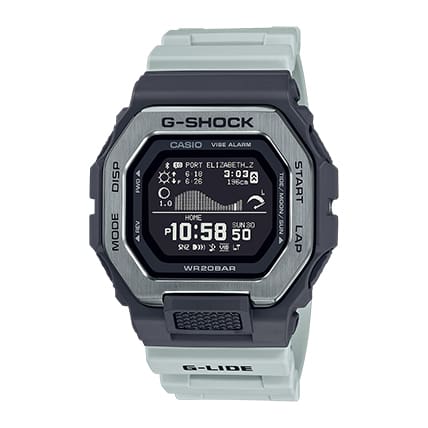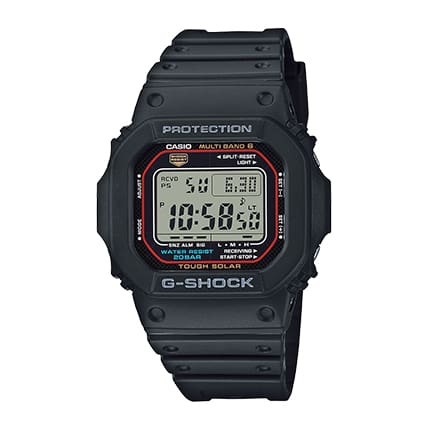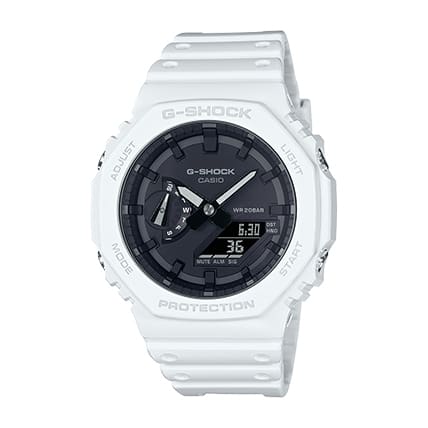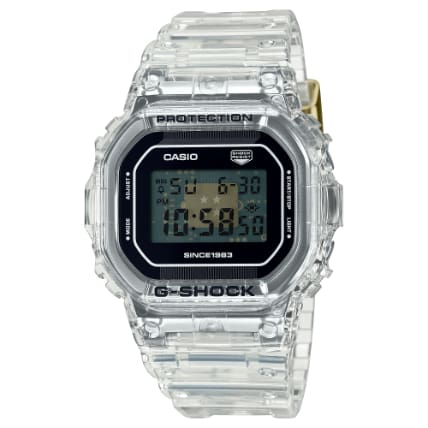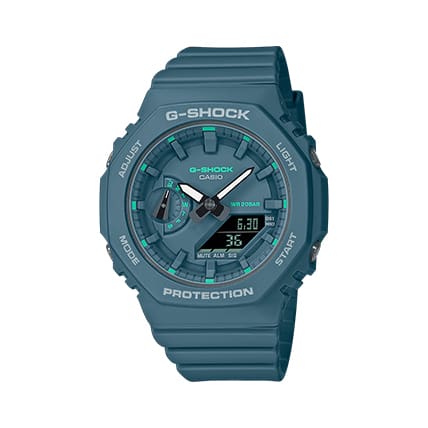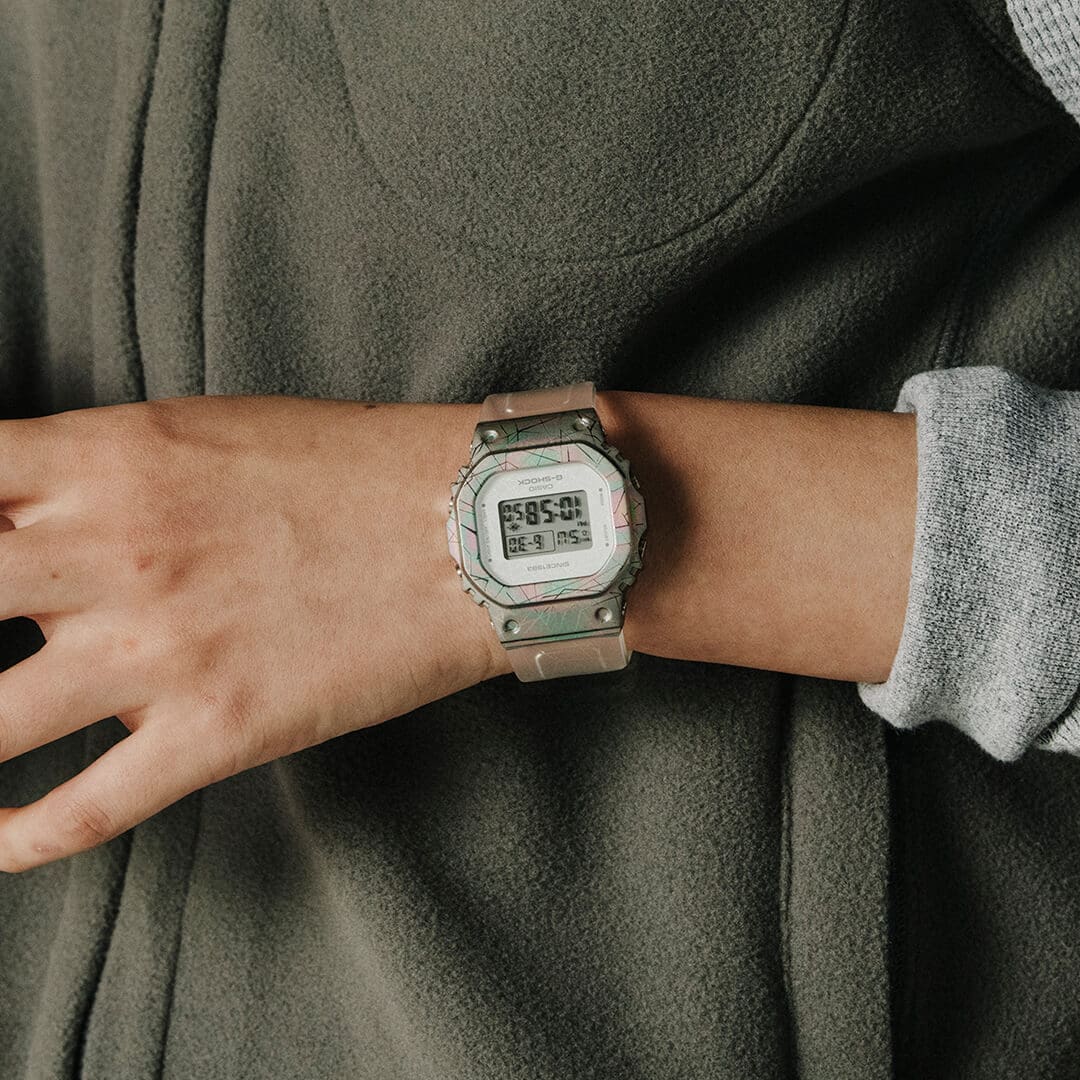
MODELS FOR THE 40TH ANNIVERSARY OF G-SHOCK
Adventurer's Stone
Sparkling, mineral-inspired watches in shapes
and colours that thrill the hearts of adventurers
The G-SHOCK spirit of supporting and guiding its wearers in overcoming challenges is now reflected in the mineral motif,
with stones used by adventurers as signposts since the Middle Ages.
The metal-coated base model is crafted using forging and processing technologies such as IP finishing, which gives it a
rough, stone-like texture and multi-coloured sparkle.
These special watches embody the spirit of adventure —
— perfect for the G-SHOCK’s anniversary.

Three minerals with adventure energy
Stones whose light-refracting properties were used to determine the position of the sun have served as both guideposts and protective charms for adventurers on the high seas. Sunstone, calcite, and cordierite, popular as energetic minerals, have symbolic meanings that give adventurers courage.
Sunstone: Bringing about victory
Calcite: Leading onward to success
Cordierite: Showing the way
LOOK



GM-5640GEM × Sunstone

Sunstone's multicolour shine, which changes depending on the viewing angle, is replicated in the forged, rainbow-colour bezel. The translucent grey band brings out the texture of the metal.
Bezel — Forging + 2-colour IP (rainbow + black)
Band — Translucent grey
Dial — Black printed

1. Expressing stony textures with forged bezels
As part of the metal-covered bezel's finishing process, we employ forging with special dies, creating a mineral-inspired rough-moulded accent across the entire bezel face. We then give the uneven portions a glossy honing, and polish each part—from the top to the sides—to a hairline or mirror finish. Each stone's shape, texture, and shine are conveyed through unique metal processing technologies.

2. Colour IP brightens up metal bezels
Since ancient times, seafarers used stones that give off certain colours depending on the light source and the viewing angle as a kind of compass to find the sun's position. Their beautiful guiding light is represented in IP finishing that suits each one's colouration. Two-colour IP goes a step further, producing complex, multi-layered tones by first applying IP to an entire surface, then masking portions and reapplying IP in an additional colour.
GM-2140GEM × Cordierite

The beautiful blue face of cordierite is expressed in the forged and IP-finished bezel and a mixed-colour moulded resin band. The polarised vapour deposition on the face gives off a different shine depending on the viewing angle.
Bezel - Forging + IP (blue)
Band - Garal colour moulding (blue + black)
Dial - Polarised blue vapour deposition

1. Expressing stony textures with forged bezels
As part of the metal-covered bezel's finishing process, we employ forging with special dies, creating a mineral-inspired rough-moulded accent across the entire bezel face. We then give the uneven portions a glossy honing, and polish each part—from the top to the sides—to a hairline or mirror finish. Each stone's shape, texture, and shine are conveyed through unique metal processing technologies.

2. Colour IP brightens up metal bezels
Since ancient times, seafarers used stones that give off certain colours depending on the light source and the viewing angle as a kind of compass to find the sun's position. Their beautiful guiding light is represented in IP finishing that suits each one's colouration. Two-colour IP goes a step further, producing complex, multi-layered tones by first applying IP to an entire surface, then masking portions and reapplying IP in an additional colour.
GM-114GEM × Calcite

The metal bezel is forged and ion plated with gold and black to represent calcite's base ore. Hot-stamping gives the band its uneven texture.
Bezel — Forging + 2-colour IP (gold + black)
Band — Black + hot-stamping
Dial — Gold vapour deposition

1. Expressing stony textures with forged bezels
As part of the metal-covered bezel's finishing process, we employ forging with special dies, creating a mineral-inspired rough-moulded accent across the entire bezel face. We then give the uneven portions a glossy honing, and polish each part—from the top to the sides—to a hairline or mirror finish. Each stone's shape, texture, and shine are conveyed through unique metal processing technologies.

2. Colour IP brightens up metal bezels
Since ancient times, seafarers used stones that give off certain colours depending on the light source and the viewing angle as a kind of compass to find the sun's position. Their beautiful guiding light is represented in IP finishing that suits each one's colouration. Two-colour IP goes a step further, producing complex, multi-layered tones by first applying IP to an entire surface, then masking portions and reapplying IP in an additional colour.
GM-S5640GEM × Calcite

Laser engraving is layered with rainbow IP on the metal bezel to recreate calcite's crystalline pattern and its gorgeous refracted-light glow. The dial and band are decorated with the same pattern.
Bezel — Laser engraved + IP (rainbow)
Band — Translucent white + hot-stamping
Dial — Rainbow printed

Colour IP brightens up metal bezels
Since ancient times, seafarers used stones that give off certain colours depending on the light source and the viewing angle as a kind of compass to find the sun's position. Their beautiful guiding light is represented in IP finishing that suits each one's colouration. Two-colour IP goes a step further, producing complex, multi-layered tones by first applying IP to an entire surface, then masking portions and reapplying IP in an additional colour.
GM-S2140GEM × Calcite

The clear yellow of some calcite is replicated in the forged form and gold IP of the metal bezel, while vapour deposition gives the dial a similar colour. The white band complements the gold-coloured face.
Bezel — Forging + IP (gold)
Band — White
Dial — Gold vapour deposition

1. Expressing stony textures with forged bezels
As part of the metal-covered bezel's finishing process, we employ forging with special dies, creating a mineral-inspired rough-moulded accent across the entire bezel face. We then give the uneven portions a glossy honing, and polish each part—from the top to the sides—to a hairline or mirror finish. Each stone's shape, texture, and shine are conveyed through unique metal processing technologies.

2. Colour IP brightens up metal bezels
Since ancient times, seafarers used stones that give off certain colours depending on the light source and the viewing angle as a kind of compass to find the sun's position. Their beautiful guiding light is represented in IP finishing that suits each one's colouration. Two-colour IP goes a step further, producing complex, multi-layered tones by first applying IP to an entire surface, then masking portions and reapplying IP in an additional colour.
GM-S114GEM × Calcite

The metal bezel with a forged form evokes the mineral's raw texture, finished with layered purple and grey IP. Hot-stamping gives the band its uneven texture, while purple vapour deposition gives the dial's parts a rich lustre.
Bezel — Forging + 2-colour IP (purple + grey)
Band — Black + hot-stamping
Dial — Purple vapour deposition

1. Expressing stony textures with forged bezels
As part of the metal-covered bezel's finishing process, we employ forging with special dies, creating a mineral-inspired rough-moulded accent across the entire bezel face. We then give the uneven portions a glossy honing, and polish each part—from the top to the sides—to a hairline or mirror finish. Each stone's shape, texture, and shine are conveyed through unique metal processing technologies.

2.Colour IP brightens up metal bezels
Since ancient times, seafarers used stones that give off certain colours depending on the light source and the viewing angle as a kind of compass to find the sun's position. Their beautiful guiding light is represented in IP finishing that suits each one's colouration. Two-colour IP goes a step further, producing complex, multi-layered tones by first applying IP to an entire surface, then masking portions and reapplying IP in an additional colour.
